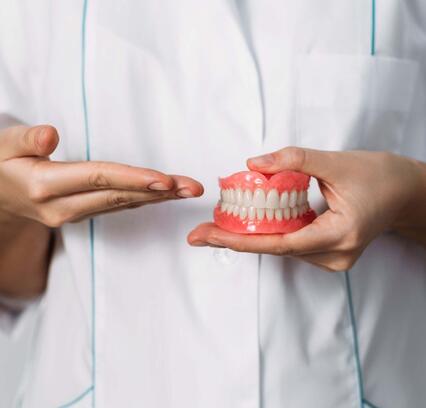Losing natural teeth can be a life-changing experience—but it doesn’t have to diminish your quality of life. Modern dentures, when fitted properly and cared for consistently, can restore your smile, improve your ability to eat and speak, and help you regain your confidence. If you're new to dentures or have been wearing them for a while, here are practical tips for living comfortably and confidently with them.
Give Yourself Time to Adjust
For first-time denture wearers, the initial few days or weeks can feel strange. You may notice increased saliva production, minor soreness, or difficulty speaking and chewing. This is normal.
Be patient and persistent. Practice speaking aloud (try reading to yourself) and eat soft foods initially, gradually moving to a normal diet. Most people adapt within a few weeks.
Ensure Proper Fit with Regular Checkups

A well-fitting denture should feel secure and cause minimal irritation. However, over time, your jawbone and gum tissue may change shape, especially after extractions or with age, which can cause looseness or discomfort.
Visit your dentist regularly to assess fit and adjust or reline your dentures if needed. Never try to adjust dentures yourself.
Master the Art of Eating with Dentures
Chewing with dentures may take some getting used to. Hard or sticky foods might pose a challenge initially.
- Start with soft foods like mashed potatoes, yogurt, or eggs.
- Cut food into small, manageable pieces.
- Chew slowly using both sides of your mouth to keep dentures balanced.
- Avoid biting into hard foods directly with the front teeth to prevent tipping.
Practice Speaking Clearly
Speaking with dentures may cause a temporary lisp or difficulty pronouncing certain words. Your tongue and muscles need time to adapt.
Clean Your Dentures Daily
Proper denture hygiene is crucial not just for the appliance itself, but also for your overall oral health.
Cleaning Routine:
- Rinse dentures after eating to remove food particles.
- Brush them daily with a soft-bristled brush and non-abrasive denture cleanser (avoid regular toothpaste, which can be too harsh).
- Soak dentures overnight in a denture cleaning solution to keep them moist and bacteria-free.
- Clean your gums, tongue, and any remaining teeth with a soft brush to prevent irritation and bad breath.
Use Denture Adhesives Wisely
If your dentures fit well but still feel slightly unstable, a denture adhesive may offer added security. They can help with suction and prevent food particles from getting under the denture.
Remove Dentures Overnight
Giving your mouth a break is important for gum health. Wearing dentures 24/7 can lead to soreness and infections like denture stomatitis.
Watch for Signs of Trouble
While minor discomfort is normal when adjusting to dentures, ongoing pain, sores, or looseness are not. These can signal improper fit or potential infections.
Report any persistent issues to your dentist promptly. Timely adjustments or a new fitting can prevent long-term problems.
Stay Positive and Social
Some people may initially feel self-conscious with dentures, especially in social settings. But remember, modern dentures are more natural-looking and comfortable than ever before.
Focus on the positives—your new smile, the ability to eat better, and improved facial support. Confidence grows with time and experience.
Maintain Good Nutrition
It’s important to eat a balanced diet even with dietary adjustments. A variety of soft, nutrient-rich foods like cooked vegetables, lean proteins, whole grains, and dairy can help support oral and overall health.
Avoid overly hard or sticky foods, but don’t restrict yourself unnecessarily. Once comfortable, most people can enjoy a wide range of foods with their dentures.
Living with dentures is a journey of adaptation, but with the right care, mindset, and support, it can be a smooth and empowering experience. Dentures can give you back the freedom to smile, eat, and speak with confidence.
Regular dental visits, consistent hygiene practices, and listening to your body are key to maintaining long-term comfort and oral health. Whether you’re new to dentures or a seasoned wearer, these tips can help you enjoy a better quality of life—one smile at a time.














